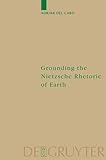Grounding the Nietzsche Rhetoric of Earth / Adrian Del Caro.
Material type: TextSeries: Monographien und Texte zur Nietzsche-Forschung ; 48Publisher: Berlin ; Boston : De Gruyter, [2023]Copyright date: ©2004Description: 1 online resource (460 p.)Content type:
TextSeries: Monographien und Texte zur Nietzsche-Forschung ; 48Publisher: Berlin ; Boston : De Gruyter, [2023]Copyright date: ©2004Description: 1 online resource (460 p.)Content type: - 9783110180381
- 9783110895230
- 100
- online - DeGruyter
- Issued also in print.
| Item type | Current library | Call number | URL | Status | Notes | Barcode | |
|---|---|---|---|---|---|---|---|
 eBook
eBook
|
Biblioteca "Angelicum" Pont. Univ. S.Tommaso d'Aquino Nuvola online | online - DeGruyter (Browse shelf(Opens below)) | Online access | Not for loan (Accesso limitato) | Accesso per gli utenti autorizzati / Access for authorized users | (dgr)9783110895230 |
Frontmatter -- Preface -- Acknowledgments -- Contents -- Abbreviations -- Chapter I: On Grounding in Relation to Rhetoric and Earth -- Chapter II: Immanence -- Chapter III: Nietzschean Religiosity -- Chapter IV: Logic and Limit in the Eternal Recurrence of the Same -- Chapter V: The Ecumenical Nietzsche -- Chapter VI: Dwelling Creatively Within the Finite -- Chapter VII: Nietzsche and the Environmental Ethos -- Works Cited -- Index
restricted access online access with authorization star
http://purl.org/coar/access_right/c_16ec
Die drei Begriffe 'grounding', 'rhetoric' und 'earth' spiegeln die dreiteilige Struktur des Buches wider. Mit philologischen Methoden zeigt Del Caro einen 'ökologischen' Nietzsche, dessen Lehren Strategien für eine verantwortungsvolle und kreative Partnerschaft zwischen Menschen und Erde darstellen. Er weist nach, dass die wichtigsten Lehren in organischer Beziehung zu frühen Schriften stehen, die sich mit Paganismus beschäftigen, mit Alltäglichem und mit den ersten und letzten Dingen in Menschliches, Allzumenschliches. Dabei verschiebt sich die Perspektive von der Zeit zum Raum in der ewigen Wiederkehr des Gleichen, und von der Macht zur Ermächtigung im Willen zur Macht.
The words 'grounding', 'rhetoric', and 'earth' represent the book's tripartite structure. Using a philological method Del Caro reveals the 'ecological' Nietzsche whose doctrines are strategies for responsible and creative partnership between humans and earth. The major doctrines are shown to be related to early writings linked to paganism, the "idian, and the closest things of Human, All Too Human. Perspective is shifted from time to place in the eternal recurrence of the same, and from power to empowerment in the will to power. This book is the first to comprehensively address the issue of where Nietzsche stands in relation to environment, and it will contribute to the 'greening' of Nietzsche.
Issued also in print.
Mode of access: Internet via World Wide Web.
In English.
Description based on online resource; title from PDF title page (publisher's Web site, viewed 06. Mrz 2024)


